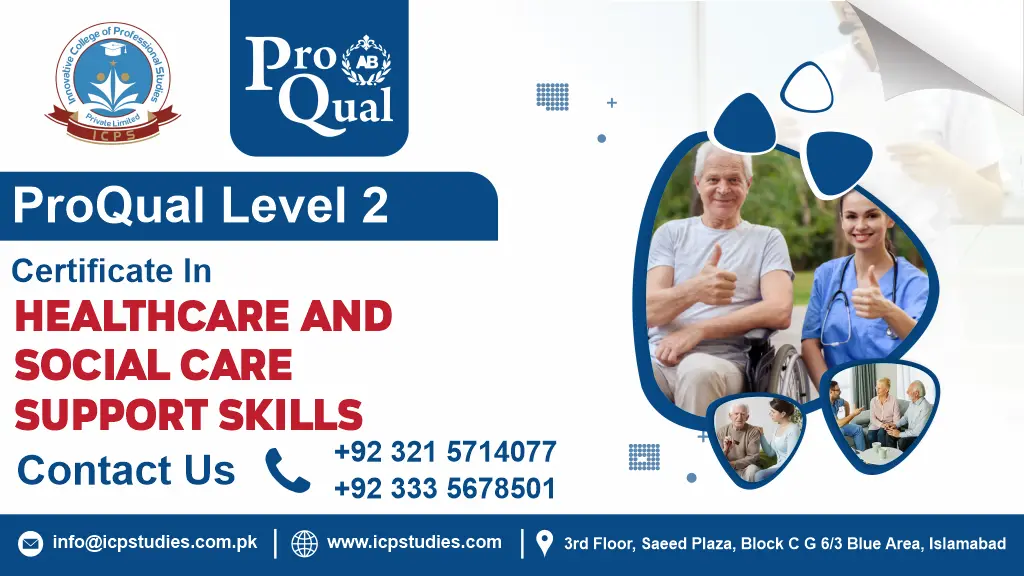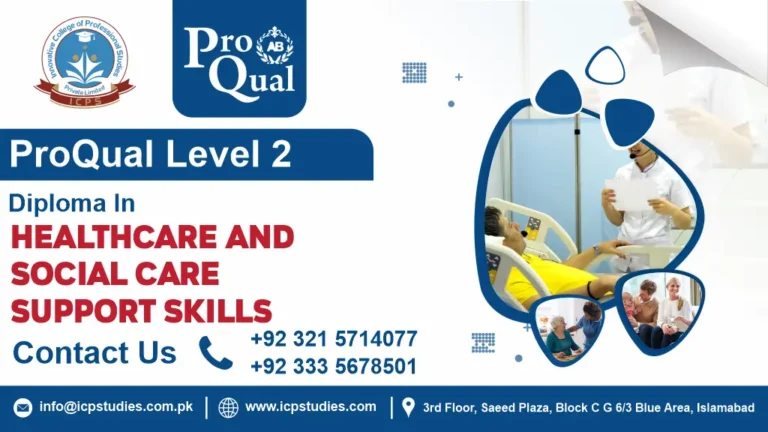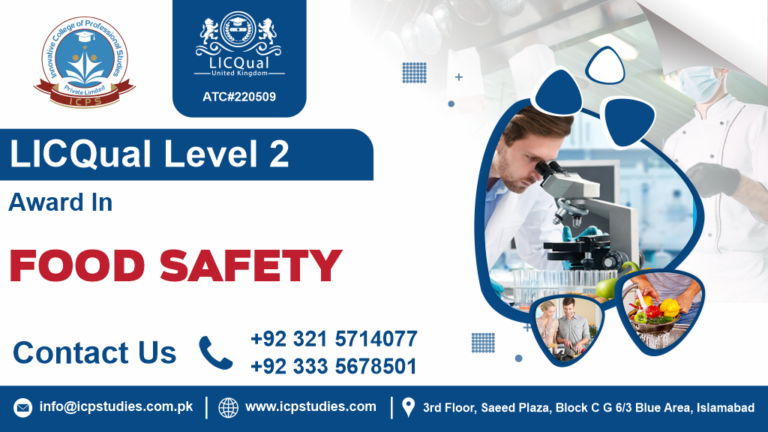Are you passionate about making a difference in people’s lives? Do you have a genuine desire to provide compassionate care and support to those in need? The ProQual Level 2 Certificate in Healthcare and Social Care Support Skills is your gateway to a fulfilling and rewarding career in the thriving healthcare and social care sector.
In the realm of healthcare and social care, every interaction matters. Whether it’s providing comfort to a patient in need or offering support to someone facing challenges, professionals in this field play a vital role in improving lives. If you’re passionate about making a difference and ready to take the next step in your caring career, the ProQual Level 2 Certificate in Healthcare and Social Care Support Skills could be your gateway to new opportunities and deeper impact.
The ProQual Level 2 Certificate is a comprehensive program designed to equip individuals with the practical skills, knowledge, and confidence needed to thrive in healthcare and social care settings. Building upon the foundational concepts covered in the Level 2 Award, this certificate delves deeper into key areas, providing a more robust framework for professional practice.
Embarking on a career in healthcare and social care is a journey of compassion, dedication, and continuous learning. The ProQual Level 2 Certificate serves as a catalyst for this journey, providing aspiring professionals with the skills, knowledge, and confidence to make a positive impact in the lives of others. Whether you’re just starting out in your caring career or seeking to enhance your existing skills, this certification offers a pathway to meaningful work, personal growth, and professional fulfillment. With the right qualifications and a heart full of compassion, you can embark on a rewarding career that not only transforms the lives of those you support but also enriches your own life in profound ways.
Don’t miss this opportunity to unlock your potential in healthcare and social care support. Enroll in the ProQual Level 2 Certificate program today and embark on a rewarding career where you can make a real difference in the lives of others. Take the first step towards a brighter future. Contact us now to learn more and secure your place!
Innovative College of Professional Studies (Private) Limited (ICPS) is offering ProQual Qualifications in association with Inspire College of Technologies (ICTQual)
All About ProQual Level 2 Certificate in Healthcare and Social Care Support Skills
Course Overview
The “ProQual Level 2 Certificate in Healthcare and Social Care Support Skills” stands as a prestigious accreditation offering individuals a thorough grasp of essential principles and practical skills crucial for excelling in the healthcare and social care arena. This certification program delves deeply into a broad spectrum of knowledge and competencies necessary to provide exemplary care and assistance to those in need.
Diving into multifaceted realms of healthcare and social care, the Level 2 Certificate covers crucial topics including communication proficiency, adherence to health and safety standards, infection prevention and control, person-centered care, safeguarding, and fostering independence. It equips learners with invaluable tools and techniques to deliver compassionate care, maintain safety protocols, and support individuals in achieving optimal well-being.
Balancing theoretical foundations with hands-on application, the certificate program ensures learners grasp the legal and ethical underpinnings of healthcare and social care practices, aligning with professional standards and guidelines. Effective communication skills are honed, facilitating meaningful engagement with individuals from diverse backgrounds with empathy and sensitivity.
Furthermore, the Level 2 Certificate underscores the development of practical skills essential for hands-on support provision. Learners master techniques for assisting with personal care tasks such as bathing, dressing, and feeding, all while upholding individuals’ privacy and dignity. They also acquire strategies for promoting independence, empowering individuals to actively participate in their care and decision-making processes.
Completion of the ProQual Level 2 Certificate in Healthcare and Social Care Support Skills not only enhances individuals’ employability but also unlocks a plethora of career opportunities within the healthcare and social care sector. Esteemed by employers, this certificate signifies a level of competence and dedication to delivering exceptional care. Graduates may pursue roles including healthcare assistants, support workers, care assistants, or advance to higher-level qualifications for specialized expertise and career progression.
Tailored to cater to the needs of both entry-level candidates and seasoned professionals seeking skill enhancement, the Level 2 Certificate provides a robust foundation for individuals to make a tangible impact in the lives of others, contribute to community well-being, and embark on a gratifying and meaningful career journey in healthcare and social care support.
Learning Outcomes
Upon successful completion of the ProQual Level 2 Certificate in Healthcare and Social Care Support Skills, learners will be able to:
- Demonstrate a comprehensive understanding of the principles and values that underpin healthcare and social care practices.
- Communicate effectively and empathetically with individuals from diverse backgrounds, promoting a person-centered approach to care and support.
- Implement appropriate health and safety procedures to maintain a safe and secure environment for individuals and colleagues.
- Apply infection prevention and control measures to minimize the risk of infections and ensure the well-being of individuals in healthcare and social care settings.
- Assist individuals with personal care tasks, such as bathing, dressing, and feeding, while respecting their dignity, privacy, and independence.
- Recognize and respond to signs of abuse, neglect, or harm, and implement safeguarding measures to protect vulnerable individuals.
- Promote and support the independence and autonomy of individuals, enabling them to make informed choices and decisions about their care.
- Demonstrate an understanding of legal and ethical considerations relevant to healthcare and social care support, maintaining confidentiality and respecting individuals’ rights.
- Collaborate effectively with other healthcare professionals and members of the multidisciplinary team to provide holistic care and support.
- Reflect on personal practice, identify areas for improvement, and engage in continuous professional development to enhance skills and knowledge in healthcare and social care support.
These learning outcomes equip learners with the necessary knowledge, skills, and attributes to provide high-quality care and support to individuals in need, ensuring their well-being, dignity, and independence are upheld.
Admission Criteria
To enroll in the ProQual Level 2 Certificate in Healthcare and Social Care Support Skills, learners are typically required to meet the following entry requirements:
- Age: Learners must be at least 16 years old. This ensures that individuals have the maturity and readiness to engage in the course content and responsibilities associated with working in healthcare and social care settings.
- Language Proficiency: As the course involves communication with individuals receiving care, a good command of the English language is essential. Learners should be able to understand and communicate effectively in English to ensure proper comprehension and delivery of healthcare and social care support.
- Educational Background: There are generally no specific educational qualifications required to enroll in this course. However, a basic level of literacy and numeracy skills is beneficial to comprehend course materials and complete assessments.
- Physical and Mental Fitness: Given the nature of the healthcare and social care sector, learners should have the physical and mental capabilities to carry out the required tasks safely and effectively. This includes being able to handle physical demands, such as assisting with personal care tasks, and maintaining emotional resilience when faced with challenging situations.
- Personal Attributes: Learners should possess qualities such as empathy, compassion, patience, and a genuine desire to help others. These attributes are vital for providing person-centered care and establishing positive relationships with individuals receiving support.
Ideal Candidate
The ProQual Level 2 Certificate in Healthcare and Social Care Support Skills is designed for individuals who have a genuine passion for helping others and aspire to pursue a rewarding career in the healthcare and social care sector. This course is suitable for:
- Aspiring Healthcare Professionals: If you dream of working in the healthcare industry and providing vital support to individuals in need, this course is an ideal starting point. It equips you with the foundational knowledge and practical skills necessary to embark on a successful career in healthcare.
- Career Changers: If you are considering a career change and have a desire to make a positive impact on people’s lives, this course offers a pathway into the healthcare and social care sector. It provides you with the essential skills and qualifications needed to transition into a new and fulfilling profession.
- Entry-Level Professionals: If you are already employed in the healthcare and social care sector and seeking to enhance your knowledge and skills, this course offers an opportunity for professional development. It enables you to broaden your understanding, refine your practical abilities, and advance your career prospects within the industry.
- Caregivers and Support Workers: If you are currently providing care and support to individuals in an informal or untrained capacity, this course allows you to formalize your skills and gain a recognized qualification. It enhances your credibility, employability, and opens doors to wider career opportunities.
- School Leavers and Graduates: If you have recently completed your education and are eager to enter the healthcare and social care field, this course provides you with a strong foundation. It equips you with the knowledge and practical skills required to begin your professional journey in a highly rewarding and respected industry.
- Those Seeking Personal Development: If you have a personal interest in healthcare and social care and wish to expand your understanding of the sector, this course offers valuable insights. It deepens your knowledge, enhances your awareness of important issues, and equips you with practical skills to provide support to individuals in your personal or community setting.
No matter your background or stage in life, the ProQual Level 2 Certificate in Healthcare and Social Care Support Skills welcomes individuals who are passionate about delivering compassionate care, promoting well-being, and making a positive impact on the lives of others.
Key Takeaways
To achieve the qualification candidates must achieve a minimum of 13 credits: a minimum of 8 credits must be from the Level 2 units and the remaining 5 credits can be from any combination of units from the Level 2 or Level 3 or Level 4 units
Level 2 Units
| Sr# | Unit Title | Credit Value | GLH |
|---|---|---|---|
| 1 | Implement person centred approaches in health and social care | 5 | 33 |
| 2 | Principles of safeguarding and protection in health and social care | 3 | 26 |
| 3 | Assist in the administration of medication | 4 | 25 |
| 4 | Carry out personal hygiene for individuals unable to care for themselves | 3 | 23 |
| 5 | Support individuals with speech and language disorders to develop their communication skills | 4 | 28 |
| 6 | Perform the non-scrubbed circulating role for perioperative procedures | 3 | 23 |
| 7 | Minimise the risk of infection when transporting and storing healthcare waste | 3 | 20 |
| 8 | Assist in the issuing of prescribed items | 3 | 15 |
| 9 | Assist in the manufacture and assembly of medicinal products | 7 | 20 |
| 10 | Assist in the preparation of documentation, materials and other items for manufacture and assembly of medicinal products | 10 | 40 |
| 11 | Support individuals to carry out their own health care procedures | 2 | 15 |
| 12 | Provide support for therapy sessions | 2 | 14 |
| 13 | Contribute to the discharge of individuals to carers | 2 | 14 |
| 14 | Paediatric Emergency First Aid | 1 | 10 |
| 15 | Introduction to communication in health, social care or children’s and young people’s settings | 3 | 23 |
| 16 | Support individuals to meet personal care needs | 2 | 16 |
| 17 | Contribute to the safe use of medical devices in the perioperative environment | 4 | 29 |
| 18 | Causes and Spread of Infection | 2 | 20 |
| 19 | Prepare documentation, materials, components and other items for the preparation of aseptic products | 6 | 10 |
| 20 | Introduction to duty of care in health, social care or children’s and young people’s settings | 1 | 9 |
| 21 | Provide support for mobility | 2 | 14 |
| 22 | Assist others to plan presentations | 2 | 16 |
| 23 | Order Routine Pharmaceutical Stock | 3 | 11 |
| 24 | Dementia Awareness | 2 | 17 |
| 25 | Move and position individuals in accordance with their plan of care | 4 | 26 |
| 26 | Support individuals to manage continence | 3 | 19 |
| 27 | Handle information in health and social care settings | 1 | 10 |
| 28 | The role of the health and social care worker | 2 | 14 |
| 29 | Obtain and test specimens from individuals | 2 | 12 |
| 30 | Prepare individuals for healthcare activities | 3 | 17 |
| 31 | Assist in planning and evaluating learning activities | 3 | 22 |
| 32 | Assist the practitioner to carry out health care activities | 2 | 13 |
| 33 | Minimise the risk of infection during the removal of used linen | 2 | 15 |
| 34 | Inform an individual of discharge arrangements | 2 | 13 |
| 35 | Understand the context of supporting individuals with learning disabilities | 4 | 35 |
| 36 | Select and wear appropriate personal protective equipment for work in health care settings | 2 | 15 |
| 37 | Monitor and maintain the environment and resources during and after clinical / therapeutic activities | 3 | 20 |
| 38 | Prepare and dress for scrubbed clinical roles | 4 | 28 |
| 39 | Care for individuals with naso-gastric tubes | 3 | 20 |
| 40 | The principles of Infection Prevention and Contro | 3 | 30 |
| 41 | Assist with the provision of a pharmacy service to meet individuals’ needs | 3 | 10 |
| 42 | Contribute to the effectiveness of teams | 3 | 5 |
| 43 | Introduction to personal development in health, social care or children’s and young people’s settings | 3 | 23 |
| 44 | Support individuals who are distressed | 3 | 21 |
| 45 | Support individuals undergoing healthcare activities | 3 | 22 |
| 46 | Prepare equipment for intraoperative cell salvage blood processing | 4 | 26 |
| 47 | Assist in receiving, handling and dispatching clinical specimens | 2 | 17 |
| 48 | Assist in the sale of medicines and products | 8 | 50 |
| 49 | Receive Pharmaceutical Stock | 3 | 9 |
| 50 | Prepare aseptic products | 10 | 40 |
| 51 | Prepare and apply dressings and drains to individuals in the perioperative environment | 2 | 18 |
| 52 | Planning and Monitoring Work | 2 | 8 |
| 53 | Cleaning, Decontamination and Waste Management | 2 | 20 |
| 54 | Ensure your own Actions Reduce risks to Health and Safety | 2 | 8 |
| 55 | Introduction to equality and inclusion in health, social care or children’s and young people’s settings | 2 | 20 |
| 56 | Provide agreed support for foot care | 3 | 23 |
| 57 | Contribute to health and safety in health and social care | 4 | 33 |
| 58 | Support independence in the tasks of daily living | 5 | 33 |
| 59 | Prepare equipment for intraoperative cell salvage blood collection | 2 | 17 |
| 60 | Maintaining quality standards in the health sector | 1 | 8 |
| 61 | Emergency First Aid Skills | 1 | 10 |
| 62 | Assemble prescribed items | 3 | 15 |
| 63 | Support participation in learning and development activities | 3 | 23 |
| 64 | Provide support for sleep | 2 | 13 |
| 65 | Remove wound closure materials | 3 | 24 |
| 66 | Support individuals to eat and drink | 2 | 15 |
| 67 | Undertake agreed pressure area care | 4 | 30 |
| 68 | Meet food safety requirements when providing food and drink for individuals | 2 | 15 |
| 69 | Understand loss and grief in end of life care | 3 | 22 |
| 70 | Understand how to work in end of life care | 3 | 28 |
| 71 | Service improvements in the health sector | 2 | 15 |
Level 3 Units
| Sr# | Unit Title | Credit Value | GLH |
|---|---|---|---|
| 1 | Work with babies and young children to promote their development and learning | 6 | 45 |
| 2 | Engage in personal development in health, social care or children’s and young people’s settings | 3 | 10 |
| 3 | Support individuals with multiple conditions and/or disabilities | 4 | 31 |
| 4 | Support individuals who are bereaved | 4 | 30 |
| 5 | Prepare for and carry out extended feeding techniques | 4 | 27 |
| 6 | Provide support to continue recommended therapies | 3 | 20 |
| 7 | Insert and secure nasogastric tubes | 4 | 30 |
| 8 | Develop positive relationships with children and young people | 4 | 30 |
| 9 | Provide advice and information to enable parents to promote the health and well-being of their newborn babies | 3 | 22 |
| 10 | Facilitate and monitor housing and accommodation services to support individuals with mental health needs | 5 | 32 |
| 11 | Collaborate in the assessment of environmental and social support in the community | 4 | 23 |
| 12 | Influencing Others at Work | 1 | 6 |
| 13 | Care for the physical and nutritional needs of babies and young children | 6 | 45 |
| 14 | Support families who have a child with a disability | 3 | 23 |
| 15 | Support individuals to manage their finances | 3 | 20 |
| 16 | Obtain venous blood samples | 3 | 24 |
| 17 | Implement therapeutic group activities | 4 | 25 |
| 18 | Collate and communicate health information to individuals | 3 | 20 |
| 19 | Provide information and advice to individuals on eating to maintain optimum nutritional status | 5 | 38 |
| 20 | Assist in the implementation of programmes to increase mobility, movement and functional independence | 4 | 28 |
| 21 | Receive and handle clinical specimens within the sterile field | 4 | 30 |
| 22 | Prepare anaesthetic environment and provide support for pre and post-operative anaesthesia and recovery | 5 | 38 |
| 23 | Make recommendations for the use of physical resources in a health setting | 5 | 33 |
| 24 | Maintaining quality standards in the health sector | 2 | 13 |
| 25 | Understand Models of Disability | 3 | 26 |
| 26 | Support individuals to access and use services and facilities | 4 | 25 |
| 27 | Promote and implement health and safety in health and social care | 6 | 43 |
| 28 | Support young people with a disability to make the transition into adulthood | 5 | 40 |
| 29 | Understand mental well-being and mental health promotion | 3 | 14 |
| 30 | Carry out vision screening | 4 | 27 |
| 31 | Assist professionals to support individuals from diverse linguistic and cultural backgrounds to access speech and language therapy services | 5 | 35 |
| 32 | Implement hydrotherapy programmes for individuals and groups | 5 | 35 |
| 33 | Deliver exercise sessions to improve individuals’ health and wellbeing | 5 | 32 |
| 34 | Provide support to the surgical team when preparing individuals for operative and invasive procedures | 4 | 32 |
| 35 | Facilitate person centred assessment, planning, implementation and review | 6 | 45 |
| 36 | Work in partnership with families to support individuals | 4 | 27 |
| 37 | Support individuals to develop and run support groups | 3 | 24 |
| 38 | Monitor own work practice in health, social care or children’s and young people’s settings | 3 | 20 |
| 39 | Perform first line calibration on clinical equipment to ensure it is fit for use | 3 | 20 |
| 40 | Monitor and review individuals progress in relation to maintaining optimum nutritional status | 3 | 26 |
| 41 | Give presentations to groups | 4 | 26 |
| 42 | Support individuals in undertaking their chosen activities | 4 | 24 |
| 43 | Control the use of physical resources in a health setting | 3 | 25 |
| 44 | Support children and young people experiencing transitions | 3 | 28 |
| 45 | Promote communication in health, social care or children’s and young people’s settings | 3 | 10 |
| 46 | Contribute to the prevention of aggressive and abusive behaviour of people | 4 | 26 |
| 47 | Service improvement in the health sector | 3 | 20 |
| 48 | Understand the process and experience of dementia | 3 | 22 |
| 49 | Understand Physical Disability | 3 | 22 |
| 50 | Support individuals with a learning disability to access healthcare | 3 | 25 |
| 51 | Undertake urethral catheterisation processes | 4 | 28 |
| 52 | Promote good practice in handling information in health and social care settings | 2 | 16 |
| 53 | Understand mental health problems | 3 | 14 |
| 54 | Perform routine Electrocardiograph ECG Procedures | 4 | 30 |
| 55 | Undertake treatments and dressings of lesions and wounds | 4 | 25 |
| 56 | Adapt and fit healthcare equipment, medical devices, assistive technology, or products, to meet individuals’ needs | 6 | 37 |
| 57 | Administer oral nutritional products to individuals | 5 | 35 |
| 58 | Promote effective communication with individuals with sensory loss | 4 | 30 |
| 59 | Work with other professionals and agencies to support individuals with physical disability | 3 | 23 |
| 60 | Support individuals to access housing and accommodation services | 4 | 24 |
| 61 | Identify information requirements in a health context | 4 | 30 |
| 62 | Prepare and reproduce permanent radiographic images | 4 | 23 |
| 63 | Develop and prepare speech and language therapy resources for alternative and augmentative communication AAC use | 4 | 25 |
| 64 | Carry out wound drainage care | 4 | 32 |
| 65 | Prepare and provide surgical instrumentation and supplementary items for the surgical team | 6 | 43 |
| 66 | Care for a newly born baby when the mother is unable to do so | 4 | 32 |
| 67 | Understand Child and Young Person Development | 4 | 30 |
| 68 | Provide support to maintain and develop skills for everyday life | 4 | 28 |
| 69 | Facilitate learning and development activities to meet individual needs and preferences | 5 | 35 |
| 70 | Enable individuals with behavioural difficulties to develop strategies to change their behaviour | 8 | 41 |
| 71 | Reprocess endoscopy equipment | 4 | 30 |
| 72 | Support individuals with cognition and learning difficulties | 5 | 34 |
| 73 | Assist in testing individuals’ abilities prior to planning physical activities | 5 | 38 |
| 74 | Support individuals to manage dysphagia | 5 | 35 |
| 75 | Provide advice on foot care for individuals with diabetes | 3 | 23 |
| 76 | Transport, transfer and position individuals and equipment within the perioperative environment | 5 | 32 |
| 77 | Understand Sensory Loss | 3 | 21 |
| 78 | Support families who are affected by Acquired Brain Injury | 3 | 30 |
| 79 | Support individuals during a period of change | 4 | 29 |
| 80 | Perform intravenous cannulation | 4 | 34 |
| 81 | Care for individuals with urethral catheters | 4 | 30 |
| 82 | Conduct routine maintenance on clinical equipment | 4 | 30 |
| 83 | Assist and support individuals to use alternative and augmentative communication systems _AAC | 5 | 35 |
| 84 | Measure and record individuals’ body fluid balance in a perioperative environment | 4 | 23 |
| 85 | Support parents/carers to interact with and care for their newborn baby | 4 | 30 |
| 86 | Deliver training through demonstration and instruction | 3 | 21 |
| 87 | Principles for implementing duty of care in health, social care or children’s and young people’s settings | 1 | 5 |
| 88 | Promote Child and Young Person Development | 3 | 25 |
| 89 | Develop and sustain effective working relationships with staff in other agencies | 4 | 24 |
| 90 | Undertake physiological measurements | 3 | 23 |
| 91 | Undertake stoma care | 4 | 30 |
| 92 | Assure the effective functioning of radiographic image processing equipment | 4 | 25 |
| 93 | Operate equipment for intraoperative cell salvage blood collection | 5 | 40 |
| 94 | Advise and inform individuals on managing their condition | 5 | 31 |
| 95 | Assist others to monitor individuals’ progress in managing dysphagia | 5 | 38 |
| 96 | Support carers to meet the care needs of individuals | 5 | 30 |
| 97 | Maintain pharmaceutical stock | 3 | 4 |
| 98 | Anatomy and Physiology for Maternity Support Workers | 2 | 20 |
| 99 | Receive prescriptions from individuals | 3 | 15 |
| 100 | Understand how to support individuals with autistic spectrum conditions | 3 | 28 |
| 101 | Support Individuals with Specific Communication Needs | 5 | 35 |
| 102 | Obtain and test capillary blood samples | 4 | 30 |
| 103 | Support individuals at the end of life | 7 | 53 |
| 104 | Contribute to effective multidisciplinary team working | 3 | 20 |
| 105 | Analyse and present health related data and information | 4 | 30 |
| 106 | Remove wound drains | 4 | 27 |
| 107 | Develop activities and materials to enable individuals to reach specific communication goals | 5 | 38 |
| 108 | Operate equipment for intraoperative cell salvage blood processing and complete intraoperative cell salvage blood process | 5 | 39 |
| 109 | Support parents/carers and those in a parental role to care for babies during their first year | 5 | 36 |
| 110 | Obtain a client history | 3 | 22 |
| 111 | Manage the availability of physical resources to meet service delivery needs in a health setting | 5 | 33 |
| 112 | Administer medication to individuals, and monitor the effects | 5 | 30 |
| 113 | Assist in the Issuing of Pharmaceutical Stock | 4 | 5 |
| 114 | Undertake an in-process accuracy check of assembled prescribed items prior to the final accuracy check | 4 | 11 |
| 115 | Promote equality and inclusion in health, social care or children’s and young people’s settings | 2 | 8 |
| 116 | Understand the impact of Acquired Brain Injury on individuals | 3 | 28 |
| 117 | Support individuals to live at home | 4 | 25 |
| 118 | Promote person centred approaches in health and social care | 6 | 41 |
| 119 | Undertake tissue viability risk assessments | 3 | 26 |
| 120 | Interact with and support individuals using telecommunications | 5 | 36 |
| 121 | Manufacture equipment or medical devices for individuals within healthcare | 4 | 30 |
| 122 | Provide support for individuals with communication and interaction difficulties | 5 | 39 |
| 123 | Monitor individuals’ progress in relation to managing their body weight and nutrition | 3 | 26 |
| 124 | Assist in implementing treatment programmes for individuals with severely reduced movement/mobility | 5 | 29 |
| 125 | Assist in the delivery of perioperative care and support to individuals | 4 | 31 |
| 126 | Examine the feet of individuals with diabetes | 4 | 32 |
Level 4 Units
| Sr# | Unit Title | Credit Value | GLH |
|---|---|---|---|
| 1 | Support disabled children and young people and those with specific requirements | 6 | 45 |
| 2 | Enable children and young people to understand their health and well-being | 5 | 38 |
| 3 | Develop and agree individualised care plans for babies and families | 5 | 38 |
FAQs for ProQual Level 2 Certificate in Healthcare and Social Care Support Skills







